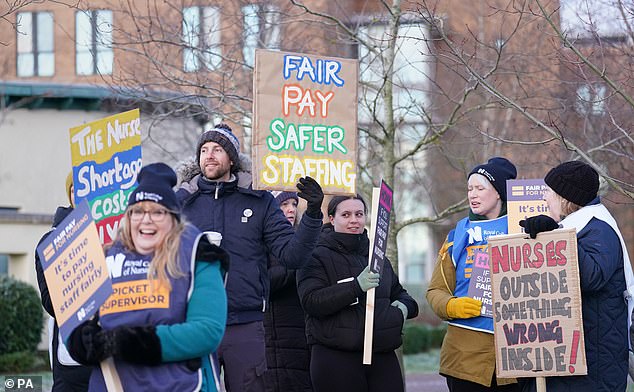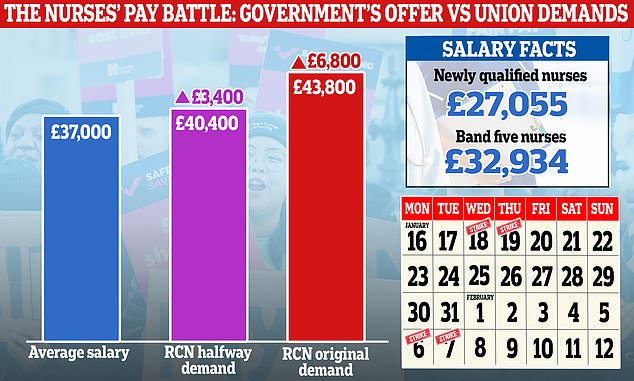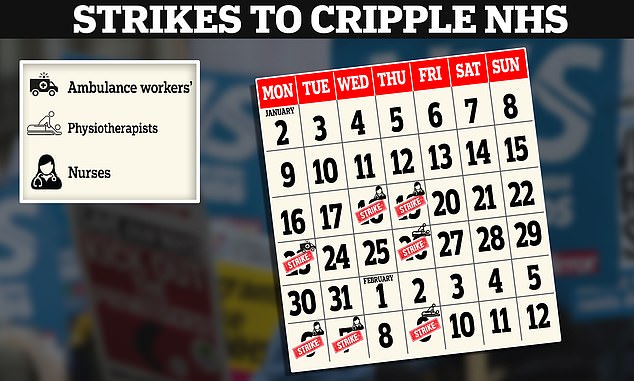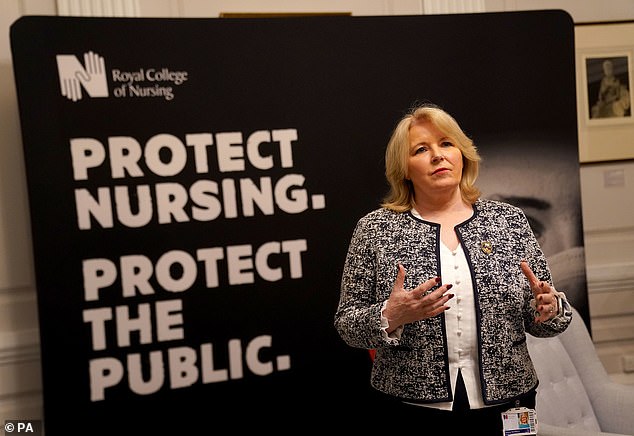Is it time for the Government to give the nurses a better pay deal? Vote here and tell us why
>
Nurses at roughly one in four hospitals across England are today taking to the picket line as the bitter pay dispute with the Government rumbles on.
Patients have been warned to expect ‘widespread disruption’, with thousands of appointments and operations expected to be cancelled.
The 48-hours of chaos comes after two separate strikes in December, which led to almost 30,000 NHS cancellations across the country.
However, unlike in the previous industrial action, the strikes are limited to England and won’t happen in Wales and Northern Ireland.
MailOnline app users can vote in the poll by clicking here.
The Royal College of Nursing, which is coordinating the action, has called for nurses to receive a pay rise five per cent above inflation.
Although, it has told the Government that it would meet halfway.
Ministers have so far refused to negotiate on pay, with the Health Secretary Steve Barclay warning any extra cash given to nurses would have to be taken from other parts of the NHS budget.
Members of the Royal College of Nursing (RCN) on the picket line outside the Norfolk and Norwich University Hospital on January 18

Members of the Royal College of Nursing (RCN) on the picket line outside the Norfolk and Norwich University Hospital on January 18

An 18.4 per cent pay rise — based on the current rate of inflation — would see the average nurses’ salary go from £37,000 to £43,800 (red bar). Meeting halfway would see it increase to £40,400 (purple bar). The Government has insisted its offer of around 4 per cent, or £1,400, is all it can afford at present (blue bar)

The Royal College of Nursing will hold its strikes over pay on January 18 and 19, as well as February 6 and 7. It joins Unison in five ambulance services on January 23. The Chartered Society of Physiotherapy will also stage strike action on January 26 and February 9

Royal College of Nursing (RCN) chief executive Pat Cullen (pictured) said today: ‘People aren’t dying because nurses are striking. ‘Today’s record number of unfilled nurse jobs cannot be left to get worse. Pay nursing staff fairly to turn this around and give the public the care they deserve’
The union says the uplift is needed to tackle a decade of pay erosion.
An 18.4 per cent pay rise — based on the current rate of inflation — would see the average nurses’ salary go from £37,000 to £43,800.
Meeting halfway would see it increase to £40,400.
The Government has insisted its offer of around 4 per cent, or £1,400, is all it can afford at present.
The deal, awarded last year, was backed by its independent NHS Pay Review Body.
But the union says the system, which was set up under Margaret Thatcher, is ‘out of date’ and ‘does not work for nurses’.
Discussions on the next pay round are already underway.
RCN chief executive Pat Cullen said: ‘People aren’t dying because nurses are striking.
‘Today’s record number of unfilled nurse jobs cannot be left to get worse.
‘Pay nursing staff fairly to turn this around and give the public the care they deserve.’
Writing in the Independent, Mr Barclay said: ‘If we provide unaffordable pay rises to NHS staff, we will take billions of pounds away from where we need it most.
‘Unaffordable pay hikes will mean cutting patient care and stoking the inflation that would make us all poorer.’
Bosses at Dorset County Hospital have asked families to ease strike pressures by supporting patients, such as helping them at mealtimes so staff can concentrate on clinical work.
One NHS Trust was yesterday offering nurses £40 an hour to cover for strikes.
GP services are not being hit because nurses in NHS practices are not involved in the strike.
Up to 100,000 nurses took to picket lines on December 15 and 20 in the first national strike in the RCN’s 106-year history.
Almost 30,000 operations and appointments were cancelled as a result across the country.
